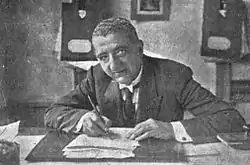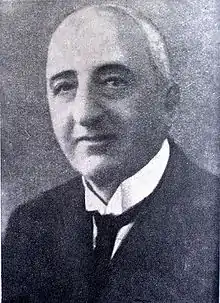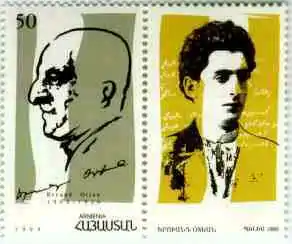Yervant Odian | |
|---|---|
| Երուանդ Օտեան | |
 | |
| Born | September 19, 1869 |
| Died | 1926 |
| Nationality | Armenian |
| Citizenship | Ottoman |
| Occupation(s) | Satirist, Journalist, Playwright |
Yervant Odian (Armenian: Երուանդ Օտեան or Երվանդ Օտյան; 19 September 1869 – 1926)[1] was an Ottoman Armenian satirist, journalist and playwright. He is regarded as one of the most influential Armenian satirists, along with his contemporary Hagop Baronian. He is best known for his work Comrade Panchooni ("Panchooni" being a pun on the Armenian words for "has nothing"), a satire mocking the Armenian revolutionary parties (such as Dashnaks and Hunchaks) of the time.
Born into a wealthy family in Constantinople, Odian left the city during the Hamidian massacres of 1894–1896 and traveled throughout Europe before returning to Constantinople in 1909. Odian was deported to the Syrian desert during the Armenian genocide and survived; he published his memoirs about his experiences during the genocide in 1919.[2]
Odian's writings, which include novels and short stories, often humorously point out humanity's vices. Odian's works also dealt with Armenian-Turkish relations and Muslim-Christian relations.[3] In a 2013 piece written by Eddie Arnavoudian, he proclaimed "Even if elsewhere equaled in modern Armenian literature, Odian's exposure of the establishment's putrid core has certainly not been bettered".[4] Odian's writing styles are often described as extroverted, as if his is removing his persona from the piece in order to best portray the truth.[5]
Biography
Early life
Odian was born into one of the most affluent families in Constantinople (now Istanbul).[5] His paternal uncle Krikor Odian (1834–1887) was a respected political figure and one of the founders and writers of the Armenian National Constitution.[5] Odian's grandfather Yazedje Boghos Agha was from Palu, Turkey, a town notable for its significant Armenian population.[6] His father was a writer, diplomat, and translator. His mother also came from a wealthy family.[5]
Early in his life, Odian attended the Berberian School in Constantinople, where he began writing.[5] Over the course of his life, Odian became fluent in a number of languages: French, Turkish, and Armenian to name a few.[5] Odian pursued writing thanks to the support of his uncle, who was a major influence in his upbringing.[5] Odian also served as a deputy of the Armenian National Assembly.[5] Though Odian's satires frequently touch on political issues, he never aligned himself with any political party.[5]
In 1896, before the massacres of Armenians in Constantinople ended, Odian left his then-home and traveled across Europe seeking asylum in places like Athens, Paris, Vienna, and London, and Bombay, before finally settling in Cairo.[7]
Later life
Yervant Odian eventually returned home to Constantinople in 1909, where he continued his work as a writer.[7] In August 1915, during the Armenian genocide, Odian was arrested and deported from Constantinople. In 1916 in Hama, Syria, he was forcibly converted to Islam and given the Muslim name Aziz Nuri, although he refused to practice the religion or use his new Muslim name.[8][9] He was then deported to Deir ez-Zor, where was able to escape death by becoming a translator for German officials there, since he knew French and Turkish. Odian's horror of the events of the Armenian genocide pushed him to write his memoirs.[5] In 1918, after World War I, he took up the responsibility of rescuing Armenian children orphaned by the genocide and placing them in orphanages. Odian returned to Constantinople and wrote for the newspaper Jamanak.[2] He published his memoirs about his experience in the Armenian genocide in Jamanak in 1919.[2] He left Constantinople in 1922 and lived in Bucharest and various locations in the Near East. Yervant Odian was an avid and heavy drinker.[5] He spent the last days of his life in Cairo, Egypt, where he died in 1926 at the age of 56.
Legacy
Some of Odian's works have been adapted into films in Armenia, including Comrade Panchooni (1992) and Monsieur Jacques and the Others (1964, based on the short story "Geghdz Lrdesě" [The False Spy]). In late 2011 the Armenian General Benevolent Union's Ardavazt Theatre Company performed Odian's Ser yev Dzidzagh (Love and Laughter), a satirical comedy focused around three revolving plots all used in junction with one another in order to portray an accurate image of nineteenth century Armenian society.[10] In 2016 the Armenian Museum of Fresno celebrated the 150th birthday of Odian by hosting an event focused on his life and his literary works.[11] There is a street named after Yervant Odian in the Malatia-Sebastia neighborhood of Yerevan.


Selected works
- Abdulhamid and Sherlock Holmes (Ապտիւլ Համիտ եւ Շէրլօք Հոլմս), Constantinople 1911
- Accursed Years. My Exile and Return from Der Zor, 1914-1919, Garod Books, London 2009
- Comrade Clueless (Ընկեր Փանջունի), Constantinople, from 1914 on (several books)
(also a Turkish edition published as 'Yoldaş Pançuni' by Aras Pub.in 2008) ISBN 978-975-7265-32-0 [12]
- Twelve Years Out of Istanbul. 1896-1908 (Տասներկու Տարի Պոլսէն Դուրս. 1896-1908), Constantinople 1922 (Reminiscences)
References
- ↑ Kermanikian, Mesrob (Summer 1961). "Yervant Odian" (PDF). Ararat. Retrieved 8 October 2011.
- 1 2 3 "Yervant Odian". www.bibliomonde.com. Retrieved 2019-11-18.
- ↑ Guerguerian, Krikor (2018-04-02). "Odyan 02". Yervant Odyan.
- ↑ "ANN/Groong -- TCC - 'Family, Honour, Morality' by Yervant Odian - Eddie Arnavoudian". groong.usc.edu. Retrieved 2019-11-18.
- 1 2 3 4 5 6 7 8 9 10 11 "Yervant Odian". acam-france.org. Association Culturelle Arménienne de Marne-la-Vallée (France). Retrieved 2019-11-18.
- ↑ "Maps| Vilayet of Diyarbekir| Palu| Locale| Population movements:: Houshamadyan - a project to reconstruct Ottoman Armenian town and village life". www.houshamadyan.org. Retrieved 2019-11-18.
- 1 2 "Yervant Odian". www.goodreads.com. Retrieved 2019-11-18.
- ↑ Teotoros Lapçinciyan (Teotig): Ամէնուն Տարեցոյցը. Ժ-ԺԴ. Տարի. 1916–1920. [Everyman's Almanac. 10.-14. Year. 1916–1920], G. Keshishian press, Constantinople 1920
- ↑ Georgelin, Hervé (March 2008). "Perception of the other's fate: what Greek Orthodox refugees from the Ottoman Empire reported about the destruction of Ottoman Armenians". Journal of Genocide Research. 10 (1): 59–76. doi:10.1080/14623520701850310. ISSN 1462-3528. S2CID 58725768.
- ↑ "AGBU Ardavazt Continues Long String of Successful Performances with Yervant Odian's "Ser Yev Dzidzagh"". AGBU | Armenian non-profit organization. Archived from the original on 2019-08-28. Retrieved 2019-11-18.
- ↑ "Yervant Odian: 150th Birthday Celebration (1869-1926)". Armenian Museum of Fresno. Retrieved 2019-11-18.
- ↑ "Aras Pub. web site". Archived from the original on 2015-05-19. Retrieved 2012-12-23.